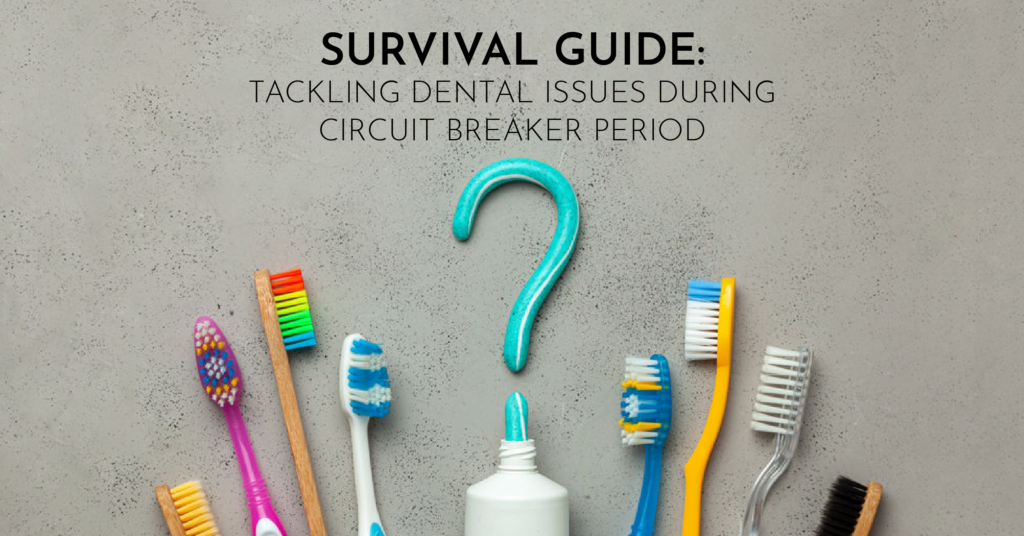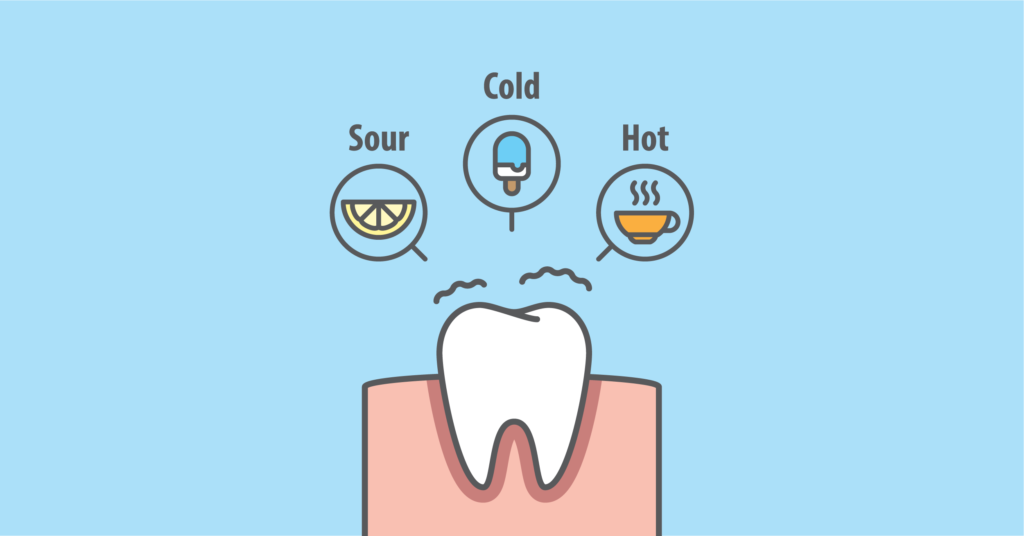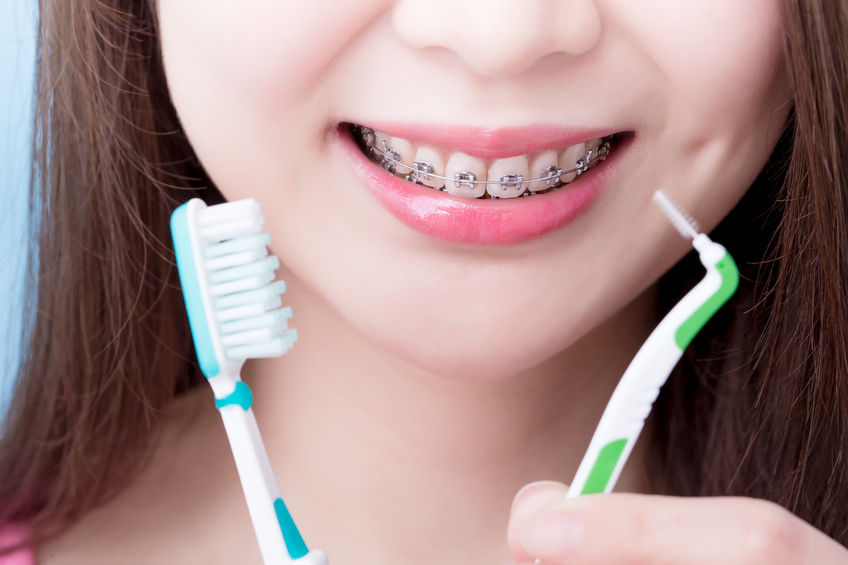
During this circuit breaker period, dental clinics in Singapore are only allowed to treat patients with urgent/emergency dental needs. This refers to conditions that require urgent attention to relieve severe pain and/or risk of infection. All other dental treatments are to be deferred until further notice from Singapore’s Ministry of Health.
We understand that many patients may have concerns about their teeth and ongoing dental treatments. Therefore, we have compiled a list of commonly faced dental issues and how you can cope with it at the moment.
Bleeding Gums
When you notice that your gums have been bleeding while you brush your teeth, it is time to do something about it! Bleeding gums is one of the early symptoms of gum disease. It should not be overlooked and it can be reversed by practicing good oral hygiene.
- Brush with a fluoride toothpaste two times a day, for at least two minutes each time.
- Ensure your teeth and gums are brushed gently, in a circular motion.
- Floss in between your teeth daily.
- Use a non-alcohol based mouthrinse.
Related: All About Mouth Rinse
One common mistake that many people make is that they stop brushing the area that is bleeding or even stop brushing totally. As bleeding gums are caused by plaque building up along the gum line, it is important to continue brushing to reduce the amount of plaque accumulating.
Another important part of maintaining good oral health is to see your dentist twice a year. Professional cleaning (scaling and polishing) by the dentist will ensure that plaque that has hardened into tartar and cannot be brushed away, are removed in the process. Therefore, if you have been missing your six monthly dental check-up, do make an appointment to see your dentist after the circuit breaker period ends.
If your gums starts to swell and cause pain, do contact your regular dentist/dental specialist or dental clinic for assistance immediately.
Sensitive Teeth
If you experience sensitivity when you eat certain food/drink or of certain temperatures – most commonly, hot or cold, sweet or acidic food/drink – you are recommended to do the following for the time being:
- Find out what food/drink is causing the sensitivity and refrain from eating them during this period.
- Avoid highly acidic food/drink such as citrus fruits or soft drinks.
- Use a desensitizing toothpaste to brush your teeth.

Make an appointment with your regular dentist or dental specialist so that he/she can examine your dental condition after the circuit breaker ends. There may be various reasons for hypersensitivity, hence a proper diagnosis will allow him/her to identify the root cause of the issue and propose the appropriate treatment plan for your condition.
Chipped Tooth
If you have chipped your tooth accidentally during this circuit breaker period, you may want to:
- Take a photo of the extent of the chip and send it to your dentist or dental specialist so that he/she can provide a recommendation for your condition remotely.
- Avoid eating or biting on that area.
- When eating, refrain from eating hard foods and chew slowly.
- Keep the area clean by brushing gently and use a non-alcohol based mouthwash.
If the chipped tooth is not causing you any pain, you can arrange for an appointment to see your dentist or dental specialist after the circuit breaker ends.
However, if you are experiencing pain or find that the remaining tooth is loose or wobbly, do contact your dentist / dental specialist to be seen soonest possible.
Broken Denture
If your denture broke during the circuit breaker period, you may contact your dentist / dental specialist for an appointment to fix the denture. During this circuit breaker period, denture adjustments or repairs are possible when function is impeded.
However, if it is broken beyond repair, your dentist / dental specialist can only make a new denture for you after the circuit breaker ends.
Broken Crown / Bridge / Filling
If your broken crown, bridge or dislodged filling is causing you pain, do contact your dentist / dental clinic for a dental appointment.
Fabrication of new crowns, bridges or placement of permanent fillings are generally done after the circuit breaker period. Therefore, if you are not experiencing any pain, you are recommended to avoid biting on the area affected for the time being.
Orthodontic Treatments
Routine orthodontic procedures such as braces monthly adjustment or Invisalign review appointments can only resume after the circuit breaker period.
Be rest assured that this delay will not affect your teeth alignment as your teeth will be held in the same position by your braces or aligners.
For patients with braces, if you are experiencing any pain due to the orthodontic wire poking or piercing your gums or inside of your cheeks, help can be extended. Do call your dental clinic for an appointment so that your dentist / orthodontist can do the necessary to alleviate your pain.
Do continue to maintain good oral hygiene by brushing well as braces have countless of tiny spaces to trap food, which can lead to many other dental problems. You are recommended to:
- Brush after every meal and use an interdental toothbrush if required
- Ensure that the wires and pins of your braces are carefully cleaned
- Floss at least once a day
- Use a non-alcohol based mouthwash

If you are at the end of your orthodontic treatment, the appointment to deband your braces will be rescheduled to a date after the circuit breaker ends.
For some Invisalign patients, your dentist / orthodontist may request for you to take photos of your smile to carry out consultations remotely. In the event that your treatment is going as planned and your teeth are tracking well, your next few sets of aligners can be couriered to you so that your Invisalign treatment can continue as usual.
Broken Retainer
For patients who had completed your orthodontic treatment, if you accidentally broke your retainer, you can make an appointment to see your dentist / orthodontist after the circuit breaker period ends.
As retainers are important in keeping your teeth alignment in position and preventing orthodontic relapse, do request for an earliest possible appointment that is available after the circuit breaker period ends.
Dental Trauma
Injuries to the mouth include teeth that are knocked out, forced out of position, pushed up or loosened, as well as tooth fracture, dental bone fracture or injury to the face or lips.
These require emergency dental treatment and you are advised to seek treatment immediately at the dental clinic or hospital’s Accident & Emergency Department.
In the event where your child’s tooth has been displaced completely (avulsed), you are recommended to do the following:
- Keep your child calm.
- Check if the displaced tooth is a primary (baby) or permanent (adult) tooth.
- Only a permanent tooth needs to be replanted.
- If it is a primary tooth, skip to step 6. It is important to still seek treatment immediately to rule out other possible injuries.
- Find the displaced tooth and hold it by the crown. Refrain from touching the roots.
- Wash the tooth for about 10 seconds under running tap water before replanting the tooth. Have your child bite on a towel with the replanted tooth and hold it in position.
- If it is not possible to replant the tooth, place the tooth in cold milk or saline solution. Refrain from wrapping the tooth in tissue paper, cloth or storing in water.
- Seek dental treatment immediately.
Discomfort
If there is any dental issue that causes discomfort during this period of time, you may be unsure whether it warrants immediate attention. Here is what we recommend:
- If the discomfort can be tolerated, make an appointment to see your dentist / dental specialist after circuit breaker ends.
- If the pain cannot be tolerated, make an appointment with the dental clinic to be seen as soon as possible.
- When unsure, you may want to make an appointment with your dentist / dental specialist for a quick examination to determine if immediate attention is needed. After examining the dental condition, he/she will do the needful if the condition requires any treatment.
With the above, you do not need to worry about yourself and we would not need to worry about you 🙂
We trust that with this comprehensive survival guide, you will have a better idea of how to tackle dental issues that you face during this circuit breaker period.
If you are experiencing a dental issue that is not in this list or would like to find out more about a particular dental issue, do feel free to email us at info@specialistdentalgroup.com.
As all non-essential dental services are deferred till Singapore’s circuit breaker period ends, or lockdown in various countries, let’s put in extra effort to care for our dental health. Brush and floss well, maintain your healthy smile!





